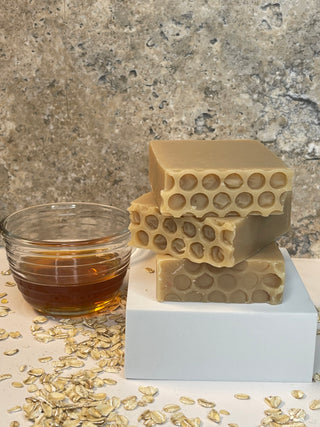In a world filled with countless soap brands and options, you may wonder, “Why choose handmade soap over big-brand soaps?” While big brands dominate store shelves, handmade soaps offer a range of benefits that can make a big difference for your skin and the environment. Here, we’ll explore why handmade soaps deserve a spot in your daily routine and how they stand out from the big-brand competitors.
1. Ingredients: Pure, Natural Goodness
- Handmade Soap: Typically made with high-quality, natural ingredients, such as plant-based oils, essential oils, and butters, handmade soaps are rich in nourishing ingredients that feed your skin. Since these soaps are often free of synthetic additives and harsh chemicals, they’re less likely to irritate sensitive skin.
- Big-Brand Soaps: Many big brands use synthetic detergents, preservatives, and artificial fragrances that can strip your skin’s natural oils, leaving it dry or irritated. Often, these soaps contain chemical stabilizers to prolong shelf life, which can further disrupt the skin’s natural barrier.
Choosing handmade soap means choosing gentle, natural ingredients designed to support skin health rather than compromise it.
2. Glycerin Retention: The Natural Skin Softener
- Handmade Soap: In the soap-making process, glycerin—a natural byproduct—forms and acts as a powerful moisturizer. Artisans keep this glycerin in handmade soaps, which helps draw moisture to the skin and leaves it soft and hydrated.
- Big-Brand Soaps: Many big brands extract glycerin from their soaps to use in other products, which can lead to a drying effect. Without this natural humectant, big-brand soaps are less hydrating and can often leave the skin feeling stripped.
Handmade soaps retain glycerin, which keeps your skin naturally moisturized and soft.
3. Craftsmanship: Small-Batch, High-Quality Care
- Handmade Soap: Artisans take pride in crafting soap with care, usually in small batches to ensure quality control. Handmade soap-makers can focus on sustainable practices, fair trade ingredients, and quality over quantity, giving you a product with a personal touch.
- Big-Brand Soaps: Large companies typically mass-produce their products, prioritizing speed and cost-efficiency. While they create soap at a larger scale, they may sacrifice ingredient quality and environmental responsibility.
When you buy handmade soap, you’re supporting skilled artisans who care about each bar they create.
4. Eco-Friendly and Sustainable
- Handmade Soap: Many handmade soap makers emphasize sustainability, using eco-friendly packaging, ethically sourced ingredients, and biodegradable formulas. By choosing handmade, you’re often supporting a small business with a commitment to eco-conscious practices.
- Big-Brand Soaps: Larger brands often rely on plastic packaging, synthetic ingredients, and high-energy manufacturing processes that contribute to pollution and waste.
Handmade soap is a more sustainable option, helping you reduce your environmental footprint while supporting green businesses.
5. Customization: Tailored to Your Skin Needs
- Handmade Soap: Since handmade soap makers produce in small batches, they often offer customization options or create products tailored to different skin types and concerns, from sensitive and acne-prone to dry and aging skin.
- Big-Brand Soaps: Big brands tend to focus on “one-size-fits-all” formulations, which can lack the personalization that handmade soaps offer.
With handmade soap, you get a unique product that can be more attuned to your specific skin needs.
Conclusion: Why Handmade Soap Is Worth It
When it comes to choosing soap for your skin, handmade options bring natural ingredients, ethical practices, and a personal touch that big-brand soaps often lack. By switching to handmade soap, you’re investing in better skin health, supporting artisans, and making a choice that benefits the planet. So next time you’re looking to replenish your soap, consider going handmade—you might just find that your skin and the world around you thank you for it.


Ariel
I love their soap and I would rather pay for small batch made soap then from the big brands.